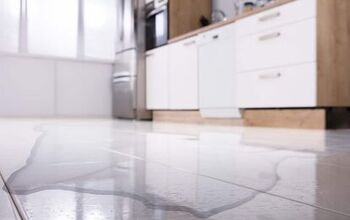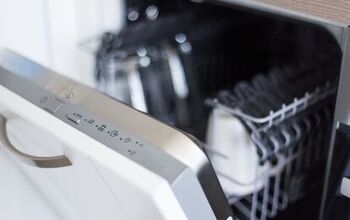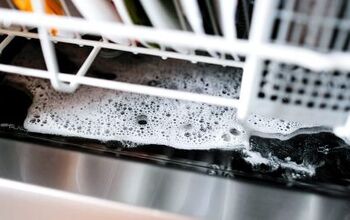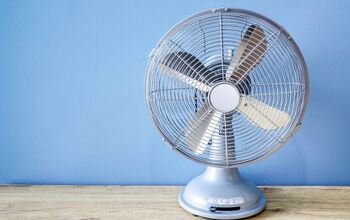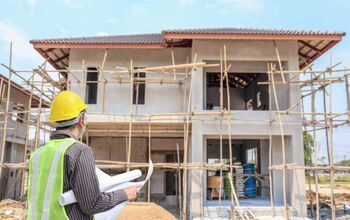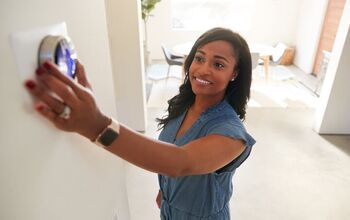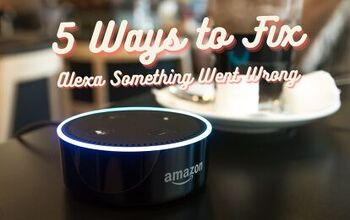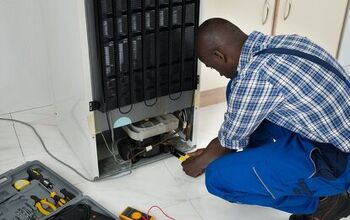Dishwasher Air Gap Leaking? (Possible Causes & Fixes)

Dishwashers are meant to keep your dishes squeaky clean, and they do it by pulsing high pressure, hot water at the dishes. Unfortunately, this doesn’t always work. One of the most common reasons why you might have a problem with your dishwasher’s security is because you have a leaky air gap. When this happens, you’ll have a mess of water spurting out of the corner of your sink. How can you fix it, though?
The reason that dishwasher air gaps leak is due to a clog. In most cases, you will be able to fix the air gap by using air pressure to force the clog out of a line. There can also be clogs in the P-trap or the water lines, but those are far less likely to cause water to leak out of your air gap.
Trying to fix this on your own can be daunting, especially if you’re not a plumber. If you’re noticing water pooling in and around your sink’s corner, you found the right article to read.
Do You Need Appliance Repair Services?
Get free, zero-commitment quotes from pro contractors near you.

What Does A Dishwasher Air Gap Do?
In order to understand what’s going on with your air gap, you need to understand what a dishwasher gap is supposed to do. The air gap is there to ensure that dishwasher water (particularly used water) doesn’t seep back into the dishwasher once it’s drained. Inside the air gap is a line from the dishwasher and a line that leads to the garbage disposal.
Air separates the two, giving the system a way to prevent contamination. When a clog occurs in either line, water starts to fill up in the gap. This causes a flood that ends up spurting water all over the corner of your sink, from the “knob” that is part of the air gap.
Could My Dishwasher Be The Cause Of An Air Gap Leak?
It’s highly unlikely. Unless your dishwasher is emitting something seriously foul, the biggest culprit is probably a clog in your water lines. With that said, it’s important to never say never. In other words, while it’s not likely, it’s also not impossible.
A Quick Note About This Guide
We are assuming that your air gap setup has been installed properly and that the knockout plug has been knocked out. If it hasn’t, turn off the water, take a hammer, and knock out the plug. You will need to use some needlenose pliers to fish it out from the garbage disposal before you can use the disposal again.
If your knockout plug has been properly knocked out, skip this step. Those who are not sure should look at a diagram of an air gap to see where the plug would be.
How To Troubleshoot Your Leaky Dishwasher Air Gap
Now that we know why dishwasher air gaps happen, let’s do a quick troubleshooting routine. When you do this, you should be able to see the leak go away.
- Begin by opening the doors underneath your sink. Look to see if there are any bends in the piping from either line. If there are, straightening them out can usually make the leak go away. Also, check to see if there is too much “line” under the sink as this can cause a clog due to reduced pressure.
- Open up the air gap cap on the top of your sink. Most can be pulled off. If not, use your user’s manual to find out how to remove it. In some rare cases, you may need to pry it off, though we don’t suggest that unless that’s the suggested way to handle it.
- Search around for clogs that are going on in and around the air gap. You will probably see some right around the entrance to each water line.
- Use a pipe cleaner to brush away any grit and grime that you see within the air gap. If there’s mold around the tank area, it’s good to remove this stuff right now.
- Grab the pipe cleaner and use it to clear out the line that heads to the garbage disposal. Don’t touch the line that runs from the dishwasher to the air gap unless it’s absolutely necessary. Most of the time, it’s the garbage disposal line, anyway.
- If there is a persistent clog, place a wet/dry vacuum over the open-air gap. Let it run for about a minute. The strength of the vacuum suction should pull out any leftover debris that could be clogging your air gap.
- Replace the air gap cap. Test out your water system again. You should be leak-free!
Is This A Good DIY Project?
In most cases, yes. Clearing out a clog in your dishwasher air gap should be fairly easy to do. As long as you have a pipe cleaner or bottle cleaner, you should be able to do it on your own. It’s a good way to make sure that you save a bunch of money on repair bills, at the very least.
Of course, if the issue is the P-trap or garbage disposal, you might want to call a professional simply because it’s a little more labor-intensive and most people find the water in P-traps to be pretty gnarly.
What Should You Do If Your Air Gap Is Still Leaking?
If your air gap is still leaking after you did a little bit of spring cleaning through the plumbing, then that means that you have a clog elsewhere in your plumbing. More often than not, a persistent leak suggests that your P-trap or garbage disposal is clogged with excess food. What you can do here can vary depending on your skill level. The most common options include:
- Temporarily remove the garbage disposal and manually clean it out. You should obviously turn off power to the disposal and place a bucket underneath the contraption should anything fall out. You can clean it out using a pipe cleaner or even a sponge.
- Get a plumber to unclog your P-trap. This can usually be done immediately after cleaning out the garbage disposal. Putting a bucket to catch water is also a must.
- Use a sink-made drain snake to pull out anything that could be stuck in your drain. You can find drain sink snakes in most grocery stores. They’re thin plastic pieces that have spikes on the end to help grab hair and other debris.
- Use an enzyme drain cleaner to clear out clogs. Enzymes make it possible to soften up hard foods and greases that cling to the pipes. If the clog is light or just very “buttery,” then an enzyme cleaner will help. This also can kill drain flies, which means it’s a great go-to for pest control too.
When Should You Call A Plumber?
A plumber is your best bet when you’ve tried everything and still cannot get the leak to stop dripping. However, you can also call a plumber if you have anxiety about working with plumbing (totally understandable) or if there appears to be a major issue with your plumbing system that extends above and beyond the typical clogs.
If you believe that the issue is not a clog in your system, but rather a problem with the dishwasher, you *might* want to call a plumber first. It’s highly unlikely that a dishwasher malfunction will cause an air gap leak, so while it might look that way, it’s safer to let a plumber diagnose it.
Do You Need Appliance Repair Services?
Get free, zero-commitment quotes from pro contractors near you.

Related Questions
Do all households need an air gap for a sink?
An air gap is only really necessary if you have a dishwasher. It’s what helps prevent contaminated water from rolling back into your dishwasher and ruining newly-cleaned dishes. If you do not have a dishwasher, then the point is moot.This is why you never see air gaps on bathroom sinks, and why many simple kitchens have a small plate over the area where an air gap would be. It’s not necessary when you don’t have all those extra wires, and at times, it may not be necessary if you have other anti-contamination measures in place.
Do air gaps go bad?
With most parts of a home, you should expect to replace their parts from time to time. Believe it or not, air gaps do not fit under this category. Once you establish an air gap, you should expect it to remain working for the rest of the lifetime of your home.Of course, an air gap will only remain useful if it is cleaned on occasion. As long as you treat your air gap well, there is no reason to replace it, aside from an aesthetic desire.
How can you tell if you need to have an air gap?
The first thing you need to do is figure out if you have a dishwasher, obviously. If you do, then you should check your local building codes. Whether or not an air gap is entirely mandatory in your locality will be up to the codes being enforced. If it’s not mandatory, you might be able to get away with an air gap alternative instead.

Ossiana Tepfenhart is an expert writer, focusing on interior design and general home tips. Writing is her life, and it's what she does best. Her interests include art and real estate investments.
More by Ossiana Tepfenhart











